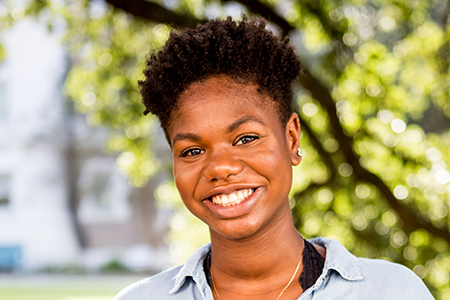 "What surprised me the most [when I got to Cape Town for study abroad] was the uniformity of blackness. People who are living the black experience in all different places in the world pretty much go through the same thing, which is the first time I had imagined that. That was pretty huge for me. It started from doing a project in my intercultural communication and leadership course. We had to do a series of interviews with someone who was a South African. I chose someone I had met and seen around my dorm at my apartment building, a black South African student. We had met for coffee a couple times, had several conversations, and I asked several questions. We talked about both our backgrounds and our families, about our identities and our backgrounds and different cultural experiences.
"What surprised me the most [when I got to Cape Town for study abroad] was the uniformity of blackness. People who are living the black experience in all different places in the world pretty much go through the same thing, which is the first time I had imagined that. That was pretty huge for me. It started from doing a project in my intercultural communication and leadership course. We had to do a series of interviews with someone who was a South African. I chose someone I had met and seen around my dorm at my apartment building, a black South African student. We had met for coffee a couple times, had several conversations, and I asked several questions. We talked about both our backgrounds and our families, about our identities and our backgrounds and different cultural experiences.
I started to see a huge parallel even though we were from completely different parts of the world, and completely different families, and have completely different stories. There was some sort of uniformity in our experiences.
In Cape Town and South Africa, activism just runs through their blood. It's a no brainer. If you don't believe something you see, you stand up and you say something. Here it's very much a 'talk' culture – everyone talks about inequalities and social problems but no one actually does anything. There, it was just so cool to see marginalized, oppressed people or people who usually are not thought of or factored into certain political systems and economic systems be like 'This is not okay... this is why and this is what we want you to do to fix it.' And putting the burden of fixing different inequalities on the oppressors and not the oppressed, that was the first time I saw that in play. It was inspiring, too, because I came back and had a fresh new look on what it meant to be an activist and what it meant to be a humanitarian."
